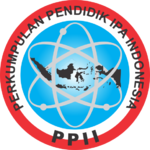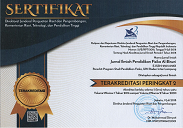The Integrated Physics Learning E-Module with Pancasila Character Values in Work and Energy Subjects as Solution to Improve Students’ Critical Thinking Ability and Independence: Is It Effective?
Abstract
Keywords
Full Text:
PDFReferences
Adi, P. (2016). Pembudayaan nilai-nilai pancasila bagi masyarakat sebagai modal dasar pertahanan nasional NKRI. Jurnal Moral Kemasyarakatan, 1(1), 39. https://doi.org/10.21067/jmk.v1i1.1185
Agung, F. P., Suyanto, S., & Aminatun, T. (2020). E-Modul gerak refleks berbasis pendekatan kontekstual untuk meningkatkan pemahaman konsep siswa SMA. Jurnal Pendidikan: Teori, Penelitian, Dan Pengembangan, 5(3), 280.http://dx.doi.org/10.17977/jptpp.v5i3.13238
Ahmadi, F., & Ibda, H. (2018). Media literasi sekolah: Teori dan praktik. Semarang: CV Pilar Nusantara.
Anita, A., & Novianty, F. (2020). The students’ characters analysis in physics learning process. Jurnal Penelitian & Pengembangan Pendidikan Fisika, 6(1), 75. https://doi.org/10.21009/1.06108
Aprilia, I., & Suryadarma, I. G. P. (2020). E-module of mangrove ecosystem (emme): Development, validation and effectiveness in improving students’ self-regulated. Biosfer, 13(1), 116–117. https://doi.org/10.21009/biosferjpb.v13n1.114-129
Ariyani, F., Nayana, T., Saregar, A., Yuberti, Y., & Pricilia, A. (2018). Development of photonovela with character education: As an alternative of physics learning media. Jurnal Ilmiah Pendidikan Fisika Al-Biruni, 7(2), 227. https://doi.org/10.24042/jipfalbiruni.v7i2.3072
Asrial, A., Syahrial, S., Maison, M., Kurniawan, D. A., & Piyana, S. O. (2020). Ethnoconstructivism e-module to improve perception, interest, and motivation of students in class V elementary school. JPI (Jurnal Pendidikan Indonesia), 9(1), 30–31. http://dx.doi.org/10.23887/jpi-undiksha.v9i1.19222
Astra, I. M., Raihanati, & Mujayanah, N. (2020). Development of electronic module using creative problem-solving model equipped with HOTS problems on the kinetic theory of gases material. Jurnal Penelitian dan Pengembangan Pendidikan Fisika, 6(2), 182. https://doi.org/10.21009/1.06205
Astuti, B., & Mufrihah, A. (2019). Arrangment of responsibility character module using expert validation. Journal of Education and Learning (EduLearn), 13(3), 402. https://doi.org/10.11591/edulearn.v13i3.9808
Aulia, L. N., Susilo, S., & Subali, B. (2019). Upaya peningkatan kemandirian belajar siswa dengan model problem-based learning berbantuan media Edmodo. Jurnal Inovasi Pendidikan IPA, 5(1), 71. https://doi.org/10.21831/jipi.v5i1.18707
Buana, V. G., & Kasanah, S. U. (2019). Pengembangan model pembelajaran berbasis permainan engklek kelas iv sekolah dasar. Jurnal Penelitian Inovasi Pembelajaran, 4(2), 132. https://doi.org/10.29407/pn.v4i2.12585
Chrisyarani, D. D., & Yasa, A. D. (2018). Validasi modul pembelajaran: Materi dan desain tematik berbasis PPK 1,2. Jurnal Pendidikan Dasar Dan Pembelajaran, 8(2), 207–208. https://doi.org/10.25273/pe.v8i2.3207
Cohen, J. (1988). Statistical Power Analysis for Behavorial Sciences (2nd ed.). Hillsdale N.J: L.Erlbaum Associates.
Darmaji, D., Kurniawan, D. A., Astalini, A., Kurniawan, W., Anwar, K., & Lumbantoruan, A. (2019). Students’ perceptions of electronic’s module in physics practicum. Journal of Education and Learning (EduLearn), 13(2), 289. http://dx.doi.org/10.11591/edulearn.v13i2.13005
Daryanto. (2013). Menyusun modul bahan ajar untuk persiapan guru dalam mengajar. Yogyakarta: Gava Media.
Derlina, D., & Srijayanti, P. (2016). Potret implementasi pendidikan karakter di SMP kecamatan patumbak sumatera utara. Jurnal Ilmiah Pendidikan Fisika Al-Biruni, 5(2), 142. https://doi.org/10.24042/jpifalbiruni.v5i2.114
Ghozali, R. Al, & Wahyuningsih, Y. (2017). Pendidikan berbasis ajaran agama dan kebudayaan masyarakat indonesia dalam menghadapi arus globalisasi. Cakrawala Dini, 8(2), 4. https://doi.org/10.17509/cd.v8i2.10536
Hake, R. . (1998). Interactive-engagement versus traditional methods: A six-thousand-student survey of mechanics test data for an introductory physics course. American Journal of Physics, 66(1), 64–74. https://doi.org/10.1119/1.18809
Hamdani, Prayitno, & Karyanto. (2019). Meningkatkan kemampuan berpikir kritis melalui metode eksperimen the improveability to think critically through the experimental method. Proceeding Biology Education Conference, 16(1), 140–142.
Harjo, B., Kartowagiran, B., & Mahmudi, A. (2019). Development of critical thinking skill instruments on mathematical learning high school. International Journal of Instruction, 12(4), 150–151. https://doi.org/10.29333/iji.2019.12410a
Hidayati, N., Pangestuti, A. A., & Prayitno, T. A. (2019). Edmodo mobile: Developing e-module biology cell for online learning community. Biosfer, 12(1), 95. https://doi.org/10.21009/biosferjpb.v12n1.94-108
Husna, A., Hasan, M., Mustafa, Syukri, M., & Yusrizal. (2020). Pengembangan modul fisika berbasis integrasi islam-sains pada materi gerak lurus untuk meningkatkan hasil belajar peserta didik. Jurnal Pendidikan Sains Indonesia, 8(1), 57. https://doi.org/10.24815/jpsi.v8i1.15539
Husna, I. Y. Al, Masykuri, M., & Muzzazinah. (2021). Development of Instructional module based on inquiry-interactive demonstration to improve students’ critical thinking skills. Jurnal Ilmu Pendidikan Fisika, 6(1), 67. http://dx.doi.org/10.26737/jipf.v6i1.1840
Husnaeni. (2016). The enhancement of mathematical critical thinking ability of aliyah madrasas student model using gorontalo by interactive learning setting cooperative model. Journal of Education and Practice, 7(8), 159. https://www.iiste.org/Journals/index.php/JEP/article/view/29404
Izzati, U. A., Bachri, B. S., Sahid, M., & Indriani, D. E. (2019). Character education: Gender differences in moral knowing, moral feeling, and moral action in elementary schools in Indonesia. Journal for the Education of Gifted Young Scientists, 7(3), 548. https://doi.org/10.17478/jegys.597765
Janah, I. N., Chamisijatin, L., & Husamah. (2018). Implementasi Pendidikan Karakter dalam Pembelajaran IPA di SMPN XY Kota Malang. Jurnal Biotek, 6(1), 2. https://doi.org/10.24252/jb.v6i1.4243
Jones, J. A. (2019). Scaffolding self-regulated learning through student-generated quizzes. Active Learning in Higher Education, 20(2), 115. https://doi.org/10.1177/1469787417735610
Kementerian Pendidikan Nasional. (2010). Bahan pelatihan penguatan metodologi pembelajaran berdasarkan nilai-nilai budaya untuk membentuk daya saing dan karakter bangsa. Jakarta: Pusat Kurikulum, Badan Penelitian dan Pengembangan.
Kirschenbaum, H. (1995). 100 ways to enhance values and morality in schoolsand youth settings. Allyn & Bacon.
Kurniasih, H. R., Edwita, & Siswono, E. (2018). Penguatan pendidikan karakter melalui pengembangan proses pembelajaran. Prosiding Seminar Dan Diskusi Nasional Pendidikan Dasar, 249.
Kurniawan, R., & Syafriani, S. (2020). Media analysis in the development of e-module based guidance inquiry integrated with ethnoscience in learning physics at senior high school. Journal of Physics: Conference Series, 1481(1), 1. https://doi.org/10.1088/1742-6596/1481/1/012062
Labudasari, E., & Rochmah, E. (2019). Pengaruh gerakan literasi sekolah terhadap karakter mandiri siswa di SDN Kanggraksan Cirebon. Jurnal Pendidikan Dasar Dan Pembelajaran, 9(1), 58. https://doi.org/10.25273/pe.v9i1.4254
Lie, A. (2004). Cooperative learning. Jakarta: Gramedia.
Malihah, E. (2015). An ideal Indonesian in an increasingly competitive world: Personal character and values required to realise a projected 2045 ‘Golden Indonesia.’ Citizenship, Social and Economics Education, 14(2), 148–156. https://doi.org/10.1177/2047173415597143
Musawwamah, S. (2019). Penguatan karakter dalam pendidikan sistem persekolahan (implementasi PERPRES nomor 87 tahun 2017 tentang penguatan pendidikan karakter). Jurnal Penelitian Ilmu Sosial dan Kegamaan Islam, 16(1), 42. http://dx.doi.org/10.19105/nuansa.v16i1.2369
Nisa, E. K., Jatmiko, B., & Koestiari, T. (2018). Development of guided inquiry-based physics teaching materials to increase critical thinking skills of highschool students. Jurnal Pendidikan Fisika Indonesia, 14(1), 19. https://doi.org/10.15294/jpfi.v14i1.9549
Noor, J. (2017). Metodologi penelitian: skripsi, tesis, disertasi, dan karya ilmiah. Jakarta: KENCANA.
Nurazizah, S., Sinaga, P., & Jauhari, A. (2017). Profil kemampuan kognitif dan keterampilan berpikir kritis siswa sma pada materi usaha dan energi. Jurnal Penelitian & Pengembangan Pendidikan Fisika, 3(2), 197. https://doi.org/10.21009/1.03211
Putri, S. M., Sulastri, & Saminan. (2017). Mempersiapkan generasi peduli lingkungan melalui pembelajaran senyawa karbon bermuatan nilai karakter. Jurnal Pendidikan Sains Indonesia, 5(2), 104. https://doi.org/10.24815/jpsi.v5i2.9824
Ramadoni, A., Yulkifli, & Ratnawulan. (2019). Development of physics module SMA/MA integrated character values based on discovery learning models with approach science process skills. Journal of Physics: Conference Series, 1185(1). https://doi.org/10.1088/1742-6596/1185/1/012068
Ramdani, R., Syamsuddin, A., & Sirajuddin, S. (2019). Development of mathematical module-problem solving approach to train student’s reflective thinking. Pedagogical Research, 4(4), 3. https://doi.org/10.29333/pr/5861
Retnowati, S., Riyadi, & Subanti, S. (2020). The Stem Approach: The development of rectangular module to improve critical thinking skill. International Online Journal of Education and Teaching (IOJET), 7(1), 2. http://iojet.org/index.php/IOJET/article/view/704
Rohmiyati, N., Ashadi, A., & Utomo, S. B. (2016). Pengembangan modul kimia berbasis inkuiri terbimbing pada materi reaksi oksidasi – reduksi. Jurnal Inovasi Pendidikan IPA, 2(2), 225. https://doi.org/10.21831/jipi.v2i2.4869
Rufii, R. (2015). Developing module on constructivist learning strategies to promote students’ independence and performance. International Journal of Education, 7(1), 18. https://doi.org/10.5296/ije.v7i1.6675
Sadaghiani, H. R. (2012). Controlled study on the effectiveness of multimedia learning modules for teaching mechanics. Physical Review Special Topics - Physics Education Research, 8(1), 1. https://doi.org/10.1103/PhysRevSTPER.8.010103
Saefullah, A., Siahaan, P., & Sari, I. M. (2017). The correlation of learning independence attitudes and student’s learning achievement on physics learning based - portfolio. Jurnal Penelitian Dan Pembelajaran IPA, 3(1), 75–76. http://dx.doi.org/10.30870/jppi.v3i1.1741
Saputra, M. R. D., & Kuswanto, H. (2019). The effectiveness of physics mobile learning (PML) with Hombo Batu theme to improve the ability of diagram representation and critical thinking of senior high school students. International Journal of Instruction, 12(2), 474. https://doi.org/10.29333/iji.2019.12230a
Siswanto, Yusiran, & Fajaudin. (2016). Keterampilan proses sains dan kemandirian belajar siswa. Jurnal Ilmiah Penelitian dan Pembelajaran Fisika, 2(2), 191. http://dx.doi.org/10.30870/gravity.v2i2.1136
Sofyan, H., Anggereini, E., & Saadiah, J. (2019). Development of E- modules based on local wisdom in central learning model at kindergartens in Jambi city. European Journal of Educational Research, 8(4), 1138. https://doi.org/10.12973/eu-jer.8.4.1139
Sopacua, J., Fadli, M. R., & Rochmat, S. (2020). The history learning module integrated character values. Journal of Education and Learning (EduLearn), 14(3), 463. https://doi.org/10.11591/edulearn.v14i3.16139
Sukiman. (2012). Pengembangan media pembelajaran. Yogyakarta: PT Pustaka Insan Madani.
Sunaengsih, C. (2017). Buku ajar pengelolaan pendidikan. Sumedang: UPI Sumedang Press.
Supardi, S. U. S. (2018). Developing of measurement of independence characteristic in middle school student’s mathematics and science. Formatif: Jurnal Ilmiah Pendidikan MIPA, 8(2), 112. http://dx.doi.org/10.30998/formatif.v8i2.2650
Susanti, N., & Djukri, D. (2018). Pengembangan modul biologi materi pokok ekosistem berbasis aktivitas siswa di pondok pesantren untuk menanamkan sikap spiritual dan kemandirian siswa developing a biology module in ecosystem subject based o n student’ s activity at islamic boarding schoo. Jornal Inovasi Pendidikan IPA, 4(1), 66. https://doi.org/10.21831/jipi.v4i1.5995
Syawaludin, A., Gunarhadi, & Rintayati, P. (2019). Development of augmented reality-based interactive multimedia to improve critical thinking skills in science learning. International Journal of Instruction, 12(4), 332. https://doi.org/10.29333/iji.2019.12421a
Tanti, Maison, Syefrinando, B., Daryanto, M., & Salma, H. (2020). Students’ self-regulation and motivation in learning science. International Journal of Evaluation and Research in Education, 9(4), 866. https://doi.org/10.11591/ijere.v9i4.20657
Ummah, R., Suarsini, E., Lestari, R., & Biologi, P. (2020). Pengembangan e-modul berbasis penelitian uji antimikroba pada matakuliah mikrobiologi. Jurnal Pendidikan: Teori, Penelitian, Dan Pengembangan, 5(5), 572–579. http://dx.doi.org/10.17977/jptpp.v5i5.13432
Walsh, C., Quinn, K. N., Wieman, C., & Holmes, N. G. (2019). Quantifying critical thinking: Development and validation of the physics lab inventory of critical thinking (PLIC). Physical Review Physics Education Research, 15(1), 2. https://doi.org/10.1103/physrevphyseducres.15.010135
Williams, J. (2003). Promoting independent learning in the primary classroom. Philadelphia: Open University Press.
Wrahatnolo, T., & Munoto. (2018). 21st centuries skill implication on educational system. IOP Conference Series: Materials Science and Engineering, 296. https://doi.org/10.1088/1757-899X/296/1/012036
Yen, T. S., & Halili, S. H. (2015). Effective teaching of higher-order thinking (HOT) in education. The Online Journal of Distance Education and E-Learning, 3(2), 43. https://tojdel.net/?pid=showissue&issueid=145
Zheng, L., Li, X., & Chen, F. (2018). Effects of a mobile self-regulated learning approach on students’ learning achievements and self-regulated learning skills. Innovations in Education and Teaching International, 55(6), 2. https://doi.org/10.1080/14703297.2016.1259080
DOI: http://dx.doi.org/10.24042/jipfalbiruni.v10i1.7749
Refbacks
- There are currently no refbacks.

Jurnal ilmiah pendidikan fisika Al-Biruni is licensed under a Creative Commons Attribution-ShareAlike 4.0 International License.
![]()








